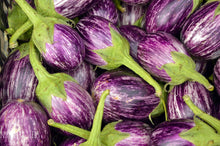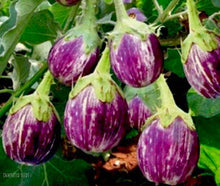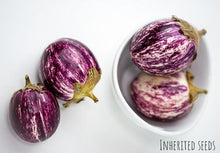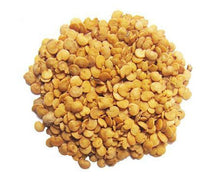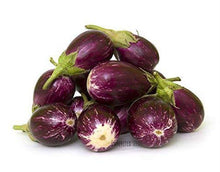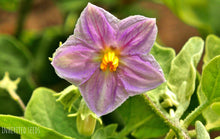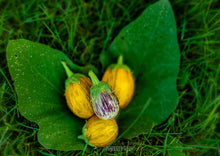
Heirloom Udumalaipet Eggplant Seeds – Rare, High-Yield, Organic & Non-GMO
🌱 Grow Rare, Authentic South Indian Eggplants in Your Home Garden! 🌱
Introducing the Heirloom Udumalaipet Eggplant, a rare, highly productive variety from Tamil Nadu, India. Known for its deep purple hue, smooth texture, and rich flavor, this eggplant is a favorite in traditional Indian, Asian, and Mediterranean cuisines. Whether you're a home gardener, urban farmer, or heirloom seed collector, these premium, open-pollinated seeds will bring you a bountiful harvest of organic, chemical-free eggplants.
Why Choose Udumalaipet Eggplant?
✅ Rare Heirloom Variety – Hard to find in stores, making it a must-have for collectors & gardeners.
✅ High-Yield & Fast-Growing – Produces abundant eggplants in just 70-80 days.
✅ Organic, Non-GMO & Open-Pollinated – Grown without chemicals, perfect for seed-saving.
✅ Heat & Drought Resistant – Thrives in hot summer climates, ideal for USDA Zones 5-11.
✅ Superior Flavor & Texture – Mildly sweet, tender, and non-bitter, making it great for curries, grilling, roasting & stir-fries.
✅ Container-Friendly – Grows well in pots, raised beds, and traditional gardens.
How to Grow Udumalaipet Eggplant
🌱 Planting: Start seeds indoors 6-8 weeks before the last frost. Transplant once soil temps stay above 60°F (16°C).
☀️ Sunlight: Full sun (6-8 hours per day) is essential for strong growth.
💧 Watering: Keep soil evenly moist, but avoid overwatering.
🌿 Soil: Rich, well-draining soil with a pH of 5.5-6.8.
📏 Spacing: Plant 18-24 inches apart for good air circulation.
🍆 Harvest: Pick when fruits are firm, glossy, and 5-7 inches long.
Perfect for Home Gardens, Small Farms & Market Growers!
Whether you're looking to grow organic produce at home or sell fresh, chemical-free eggplants at the farmer's market, Udumalaipet Eggplant is a top choice for quality and productivity.
Popular Uses:
🍛 Indian Cooking: Essential for sambar, bharta, stuffed eggplants & curries.
🔥 Grilling & Roasting: Brings out its sweet, smoky flavors.
🥗 Stir-Fries & Casseroles: Adds a creamy, mild taste to any dish.
🥒 Pickling & Fermenting: Create homemade pickled eggplants for a tangy twist.
Frequently Asked Questions (FAQs)
❓ How long does it take for Udumalaipet Eggplant to grow?
It matures in 70-80 days, producing continuous fruit throughout the season.
❓ Can I grow this eggplant in pots or small spaces?
Absolutely! Use 5-gallon pots or larger grow bags for best results.
❓ Is this variety resistant to pests and diseases?
Yes! It's naturally resistant to many common eggplant pests, but organic pest control (like neem oil) is recommended.
❓ Does this eggplant have a bitter taste?
No, Udumalaipet Eggplant is mild, slightly sweet, and tender, making it a great choice for all cuisines.
Order Your Heirloom Udumalaipet Eggplant Seeds Today!
📦 Fast Shipping Across the USA!
🌱 Fresh, Hand-Picked Seeds for Maximum Germination!
💯 Satisfaction Guaranteed – Expert Growing Tips Included!
✅ heirloom eggplant seeds
✅ rare Indian eggplant variety
✅ best eggplant for Indian cooking
✅ organic non-GMO eggplant seeds
✅ high-yield eggplant for home gardens
✅ heat-tolerant eggplant variety
✅ fast-growing eggplant seeds
Heirloom Udumalaipet Eggplant Seeds – Rare, Organic, Non-GMO, and High-Yield. This traditional South Indian variety produces deep purple, tender, and flavorful eggplants, perfect for curries, grilling, and roasting. Naturally heat and drought-resistant, it thrives in warm climates and is ideal for container gardening. Open-pollinated and seed-saving friendly. Grow your own farm-fresh, chemical-free eggplants with our premium heirloom seeds. Fast shipping available!
Click here to download our free vegetable growing guide







